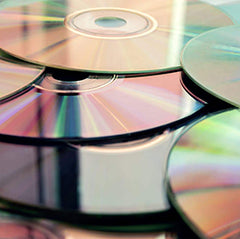
Even though there are newer ways to store digital information these days, the compact disc (CD) still plays an important role in data and audio storage. Common uses include music albums, backups of music libraries, or storage of private information that’s too sensitive to leave on a hard drive. But although it’s been around for some time now, the terminology surrounding the CD is still confusing and there are many types of discs available. One question in particular is often asked: What is the difference between a data CD and an audio CD?
A Little History
The compact disc first appeared on the music scene in 1982 as a replacement for the vinyl record. CD sales soon surpassed records and eventually cassette tapes as well. It originally was used for audio recordings, and later on was adapted for data. Other types of discs were derived from this original format to store videos, photos, and other digital media. The standard format held approximately 80 minutes worth of audio or around 700 MB of data.
Types of Compact Discs
There are three principle types of discs: standard (CD), recordable (CD-R), and rewritable (CD-RW). You can identify the type by printed logos on the disc itself. The same logos usually appear on players or burners as well so you’ll know what works with what. If you don’t see a logo on a device, it’s most likely listed in the manual.
There are differences between the types of compact discs. Simply stated, only CD-RWs can be used for multiple recordings, but they require a compatible device for playing. CD-Rs, which work in almost all standard CD players, are burned only once and content can’t be erased. Recordable CDs are broken down further into two categories: audio (music) and data (computer).
The Data CD
Typically used in a computer, a data CD is formatted to store certain files like word documents, spreadsheets, or graphics, and it is often used for transferring or backing up information. A good example of a data CD is one that’s used to install software on your computer. Data CDs are also used for storing personal documents like banking information, business plans, or tax forms. By storing or archiving information on discs, you keep it out of reach from hackers, thieves, or just nosy people. Your information is also safe from computer viruses.
The Audio CD
Audio compact discs are specially formatted with tracks for listening to music, lectures, book readings, etc. An example is a CD of your favorite band that you bought at a music store. Because this type is a universal format, it can usually be played on most CD players. This does not include CD-RWs, though.
We Can Help
Call Disc Hounds at 610-696-8668 with any questions about digital storage or duplicating. For almost 20 years, we’ve been successfully duplicating content on CDs, DVDs, and USB flash drives with speedy turnaround times, quality results, and excellent service.

